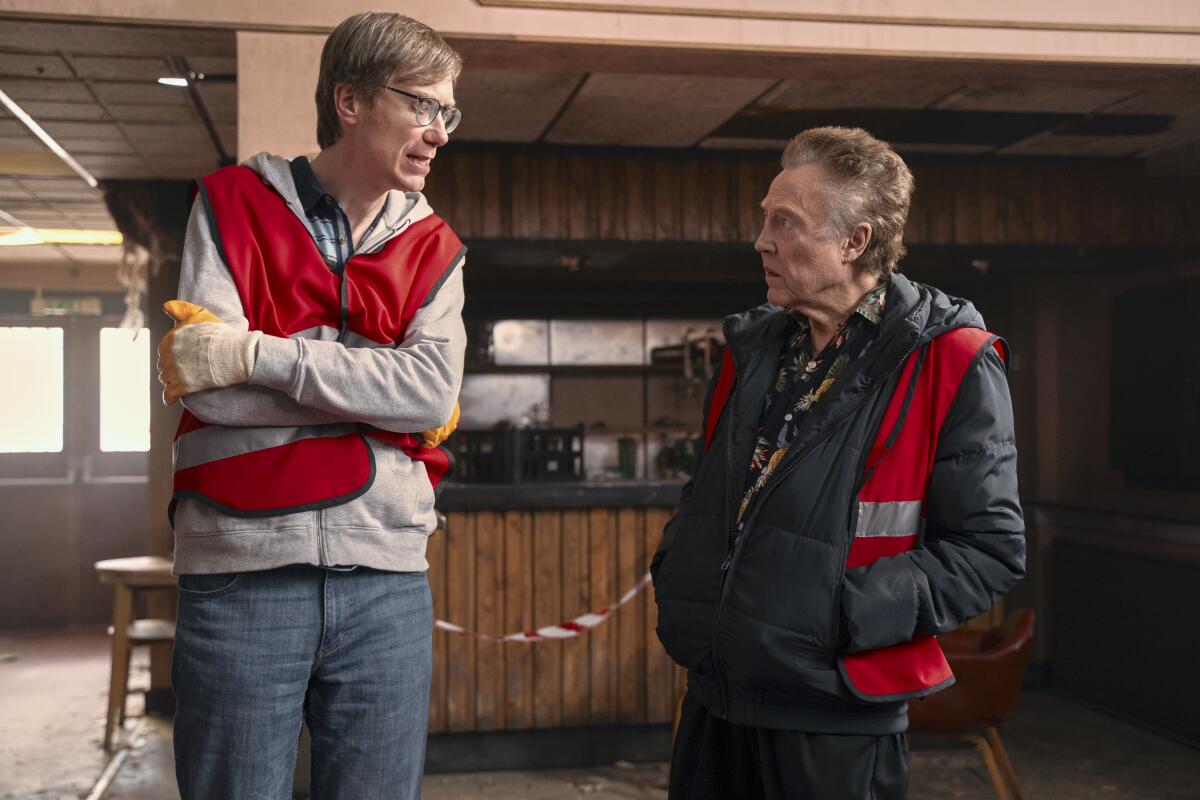Christopher Walken’s quirks shine bright in comedy-thriller ‘The Outlaws’

- Share via
The 79-year-old Christopher Walken has made a long, Oscar-winning career out of setting every scene askew. With an offbeat line delivery that largely sidesteps the rules of punctuation, and a dancer’s mercurial sense of rhythm, Walken approaches every moment from a fresh angle.
In Stephen Merchant and Elgin James’ new crime comedy “The Outlaws,” the icon of idiosyncrasy seems particularly out of place. Set in the rugged old port town of Bristol, where it follows the story of seven down-on-their-luck strangers forced together for community service, the series offers up a vivid cross-section of post-Brexit England. But Walken’s shifty ex-con, Frank, communicates in the accent and cadences of the actor’s native Queens, N.Y.
Speaking from his home in rural Connecticut, Walken explains that “Frank is an American guy who went to England 40 years earlier. And he stayed there. He married, had children and became an expat. [But] it seems to me that he hadn’t assimilated whatsoever. He’s lived in England, but he’s pretty much the way he was when he left America.”
Walken is drawn to characters who can’t quite adjust to their surroundings, an inclination he credits to his Queens childhood. “Both of my parents came to America when they were about 40 years old,” he says. “And in the neighborhood where I grew up, people spoke many languages in the street. When they spoke English, it was broken English … lots of hesitating and searching for the right word. I grew up listening to English spoken that way. And I think it has had an effect on the way I speak.”
“The Outlaws” oscillates in tone from broad comedy to pulse-pounding thriller, and Walken’s Frank is both a heartbreaker — described by his own daughter as “a lying, thieving, selfish old bastard” — and a goofball. (If you’ve ever wanted to see Walken perform a karaoke duet to the Pussycat Dolls, consider your wish granted.)
“I’m not sure there is a difference between so-called comedy and so-called drama,” he says. “You just try to do it as if you were making it up, as if the dialogue was coming out of your own brain. [You want] to know the material so well that you don’t have to think about it anymore.”

Merchant, who created “The Outlaws” and appears as part of its ensemble, knew immediately that he wanted someone like Walken for the role and was pleasantly surprised to find the actual Walken available and willing.
“I knew [Merchant’s] work — he’s pretty amazing — and coincidentally had just seen him on an American television interview,” Walken says. Merchant journeyed to Connecticut to visit the star, and Walken sealed the deal by cooking him an omelet.
Even though the role seems tailor-made for Walken, the famously prolific “Deer Hunter” and “Catch Me If You Can” star claims that he has never been choosy. “I’ve always approached acting as [being] a guy with a job, making a living,” he says. “I choose things to a certain extent, but I’ve always just tried to keep working and taking the next best thing that comes along, and hoping for the best.”
This approach extends to other parts of Walken’s life. “I don’t travel much,” he says. “I don’t [need] to get on a plane and go somewhere, because my job already takes me to very interesting places. Even most of the clothing that I wear is from movies I’ve done. They’ll give me a jacket or a shirt or something. My life is very oriented around what I do for a living.”
Despite a busy showbiz career and streetwise sensibility, Walken lives a quiet life (with casting director Georgianne Walken, his wife of 55 years) in Connecticut, where he famously doesn’t own a cellphone or computer. “I’ve seen ‘The Outlaws’ because they sent me the discs,” he says, “but I have not seen it on Amazon [Prime]. I wouldn’t know how to do that.”
Walken will testify to the benefits of life off the grid, but he also harbors nostalgia for Hollywood’s industrial past.
“If I’d been born 20 or 30 years earlier,” Walken says, “I think I would’ve enjoyed working in the studio system. You read books about the great stars, but there were also all these recognizable supporting actors who made 250 to 350 movies, and they had houses and families and wonderful regular lives, and they made a pretty good living.
“They had the sunshine and the beach,” he continues. “And they would get in the car in the morning and go to the studio and work in one of the great soundstages. And then maybe after lunch, they’d go down the street and be in a different movie, [wear] a different costume, play a different part. I think I would have liked that — to be able to go home and sleep in your own bed.”
Walken is too singular, too strange (and too famous) a performer to be mistaken for a bit player. But in shows like “The Outlaws,” he continues to perfect his own vision of the ideal “supporting actor,” soft-shoeing on the line between blending in and standing out. He might be the most distinctive “guy with a job” in the business.
More to Read
Sign up for The Envelope
Get exclusive awards season news, in-depth interviews and columnist Glenn Whipp’s must-read analysis straight to your inbox.
You may occasionally receive promotional content from the Los Angeles Times.






